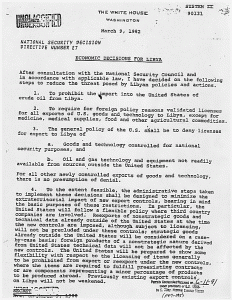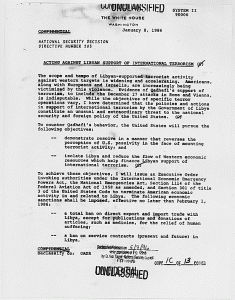By Callie Oettinger
In his April 14, 1986 address to the nation on the United States Air Strike Against Libya, President Reagan reported:
“At 7 o’clock this evening eastern time air and naval forces of the United States launched a series of strikes against the headquarters, terrorist facilities, and military assets that support Mu`ammar Qadhafi’s subversive activities. The attacks were concentrated and carefully targeted to minimize casualties among the Libyan people with whom we have no quarrel. From initial reports, our forces have succeeded in their mission. . . .
“On April 5th in West Berlin a terrorist bomb exploded in a nightclub frequented by American servicemen. Sergeant Kenneth Ford and a young Turkish woman were killed and 230 others were wounded, among them some 50 American military personnel. This monstrous brutality is but the latest act in Colonel Qadhafi’s reign of terror. The evidence is now conclusive that the terrorist bombing of La Belle discotheque was planned and executed under the direct orders of the Libyan regime. On March 25th, more than a week before the attack, orders were sent from Tripoli to the Libyan People’s Bureau in East Berlin to conduct a terrorist attack against Americans to cause maximum and indiscriminate casualties. Libya’s agents then planted the bomb. On April 4th the People’s Bureau alerted Tripoli that the attack would be carried out the following morning. The next day they reported back to Tripoli on the great success of their mission.
“Our evidence is direct; it is precise; it is irrefutable.”
Leading up to that date:
“On August 19, 1981, U.S. planes based on the carrier U.S.S. Nimitz shot down two Libyan jets over the Gulf of Sidra after one of the Libyan jets had fired a heat-seeking missile. The United States periodically held freedom of navigation exercises in the Gulf of Sidra, claimed by Libya as territorial waters but considered international waters by the United States. (from the Congressional Research Service report “Africa Command”)
March 9, 1982: Economic Decisions for Libya
January 7, 1986: Executive Order 12543: Prohibiting Trade and Certain Transactions Involving Libya
January 8, 1986: Acting Against Libyan Support of International Terrorism
“On March 26, 1986, President Reagan reported to Congress that, on March 24 and 25, U.S. forces, while engaged in freedom of navigation exercises around the Gulf of Sidra, had been attacked by Libyan missiles and the United States had responded with missiles.”(from theCongressional Research Service report “Africa Command”)
Additional Reading:
April 22, 1986: President Reagan’s Interview with Foreign Journalists
War Powers, Libya, and State-Sponsored Terrorism
- Hearings before the Subcommittee on Arms Control, International Security and Science of the Committee on Foreign Affairs, House of Representatives (1986)
The Green Book: Part One, The Solution of the Problem of Democracy (1980)
- Muammar Al Qathafi
Libya (2002)
- Clyde R. Mark, Congressional Research Service
Terrorism and National Security: Issues and Trends (2003)
- Raphael Perl, Congressional Research Service
Termination of Executive Order 12543 (2004)
Libya: Progress on the Path Toward Cautious Reengagement (2005)
- Hearing Before the Committee on International Relations, House of Representatives
The Iran-Libya Sanctions Act (ILSA) (2005)
- Kenneth Katzman, Congressional Research Service
Disarming Libya: Weapons of Mass Destruction (2006)
- Sharon Squassoni, Congressional Research Service
Africa Command: U.S. Strategic Interests and the Role of the U.S. Military in Africa (2010)
- Lauren Ploch, Congressional Research Service
Libya: Background and U.S. Relations (2011)
- Jim Zanotti, Congressional Research Service
- CIA Factbook
- U.S. Department of State
CALLIE OETTINGER was Command Posts’ first managing editor. Her interest in military history, policy and fiction took root when she was a kid, traveling and living the life of an Army Brat, and continues today.


